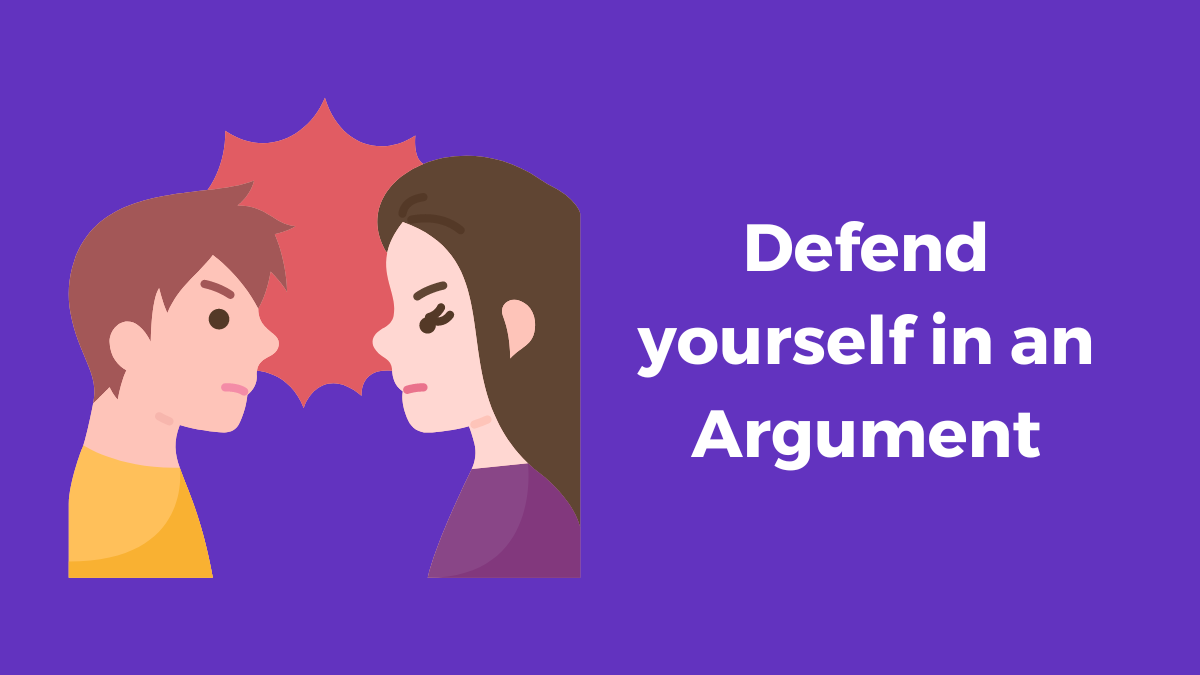
How to defend yourself in an argument
It's common to find ourselves in situations where the other person is attempting to distort our words or misrepresent them. Or when we found ourselves frustrated and unheard in the middle of an argument. The argument is a common scenario it can happen to anyone.
Also Read - How to express thoughts and ideas clearly?
In this article, we will learn how to effortlessly defend yourself in an argument. So get ready to discover the art of constructive self-defense!
Table of Contents
- Why defending yourself in an argument is important?
- How arguments can escalate and become destructive?
- The benefits of learning how to defend yourself constructively
- Understand the Dynamics of Arguments
- Know your Triggers
- Prepare yourself
- Stay calm and focused
- Listen to the Other Person
- Respond Effectively
- Keep the Conversation Constructive
- Learn when to disengage
- Conclusion
Why defending yourself in an argument is important?
It's crucial to defend yourself in an argument because it allows you to express your perspective. Failing to assert yourself could lead to brewing resentment and potentially damage your relationship with others. It's important to communicate your thoughts and feelings to ensure that your voice is heard and understood.
How arguments can escalate and become destructive?
Arguments can escalate and become destructive if both parties refuse to listen and become defensive. This can lead to hurt feelings and even physical altercations in some cases.
The benefits of learning how to defend yourself constructively
There are several benefits of learning how to defend yourself constructively. Including improved communication, increased respect, better relationships, in boosted self-confidence.
Understand the Dynamics of Arguments
How do arguments happen?
Arguments can happen for a variety of reasons. At their core, arguments arise from differences in opinion or perspective. These differences can be related to anything from a minor disagreement over the best restaurant in town to more serious issues like politics, religion, or values.
What causes arguments to escalate?
Arguments can escalate for many reasons, but one common cause is the inability to listen and communicate effectively. When individuals feel unheard or dismissed, they may become defensive or aggressive, leading the conversation to spiral out of control.
The different types of arguments
There are several types of arguments, each with its dynamics and characteristics. One type of argument is a debate, where individuals present opposing views in a formal and structured manner. Another type is conflict, which tends to be more emotional and personal. Conflict often arises from unmet needs or unresolved issues, and can be more difficult to navigate than a debate.
Know your Triggers
What triggers you in an argument?
In an argument, it's common for individuals to become triggered, or experience a strong emotional response that can make it difficult to communicate effectively. Triggers can be different for every person and can be related to their past experiences, personal values, and beliefs.
How to identify your triggers?
To identify your triggers, it's important to reflect on past arguments and try to identify what specifically caused a strong emotional reaction. This could include feeling disrespected, unheard, or invalidated.
Strategies for managing your triggers?
For managing triggers, one strategy can be to take a break when you feel triggered.
It includes taking a few deep breaths, a short walk, or engaging in a calming activity like yoga or meditation.
A short break gives you time to cool down and process your emotions, which can help you communicate more effectively when you return to the conversation.
Another strategy is active listening. By listening actively, you can reduce the likelihood of becoming triggered and increase the chances of finding a mutually beneficial solution.
Prepare yourself
Preparing yourself ahead of time can be incredibly helpful when it comes to defending yourself in an argument.
Here are a few steps you can take to prepare for a disagreement:
- Identify the issue - Before you can prepare for a disagreement, you need to identify what the issue is. What are you disagreeing about? What are the main points you want to communicate?
- Plan - Once you know what the issue is, you can start planning. Think about what you want to say and how you want to say it. Consider the other person's perspective and anticipate any objections or counterarguments they might have.
- Gather evidence - If possible, gather evidence to support your position. This could include statistics, research studies, or personal experiences. Having evidence to back up your argument can make it more persuasive and help you feel more confident in your position.
- Practice - Take some time to practice what you want to say. You can do this by rehearsing your argument out loud or writing it down. Practice can help you feel more comfortable and confident when it comes time to have an actual disagreement.
By taking these steps to prepare yourself, you can increase your chances of successfully defending yourself in an argument. Remember, the goal is not necessarily to "win" the argument, but rather to communicate your point of view clearly and respectfully.
Stay calm and focused
One of the most important things you can do when defending yourself in an argument is to stay calm and focused.
Here are a few strategies you can use to maintain your composure and keep your emotions in check:
- Take a deep breath - When you feel yourself getting upset or frustrated, take a few deep breaths to help calm yourself down. This can help slow down your heart rate and reduce feelings of stress or anxiety.
- Focus on your goal - Remember your goal is to communicate your point of view effectively. Try to keep that goal in mind, and avoid getting sidetracked by personal attacks or unrelated issues.
- Use "I" statements - When communicating your position, use "I" statements instead of "you" statements. This can help avoid coming across as accusatory or confrontational.
- Listen actively - Active listening involves fully engaging with the other person's perspective and trying to understand their point of view. By listening actively, you can reduce the likelihood of becoming triggered and increase the chances of finding a mutually beneficial solution.
- Use relaxation techniques - Consider using relaxation techniques like deep breathing, progressive muscle relaxation, or visualization to help you stay calm and focused during the argument. You can also try taking a break and engaging in a calming activity like yoga or meditation to help reduce feelings of stress or anxiety.
By staying calm and focused, you can increase your chances of having a constructive and productive disagreement. Remember, the goal is not to "win" the argument, but rather to communicate your point of view effectively and find a mutually beneficial solution.
Listen to the Other Person
The importance of active listening
When engaging in an argument, it's important to not only focus on getting your point across but also to actively listen to the other person. Active listening involves fully engaging with the other person's perspective, paying attention to their words, and trying to understand their point of view.
Understanding the other person's point of view
Understanding the other person's point of view can help you see the issue from a different perspective and potentially find common ground. It can also show the other person that you value their opinion and are willing to consider their thoughts and feelings.
Using empathy to connect with the other person
Using empathy is a powerful tool in active listening, as it involves putting yourself in the other person's shoes and trying to understand their emotions and experiences. By empathizing with the other person, you can build a connection and foster a more positive and constructive conversation.
Respond Effectively
When responding to an argument, it's important to use assertiveness to communicate effectively. This involves expressing your thoughts and feelings clearly and directly, without attacking the other person.
One way to do this is by stating your position clearly and using "I" statements to avoid placing blame on the other person. For example, instead of saying "You never listen to me," try saying "I feel unheard when you interrupt me."
It's also important to acknowledge the other person's point of view, even if you don't agree with it. This shows that you are listening and trying to understand their perspective, which can lead to a more productive conversation. You can use empathy to connect with the other person and find common ground, even if you have differing opinions.
Keep the Conversation Constructive
During an argument, it's important to keep the conversation constructive to avoid any further escalation or hurt feelings.
Here are some strategies for keeping the conversation on track:
- Stick to the issue - Make sure you're discussing the problem at hand, not other unrelated issues. This will help you stay focused and avoid getting sidetracked.
- Avoid personal attacks - Instead of attacking the other person, focus on the problem and how you can work together to find a solution. Using "I" statements instead of "you" statements can also help to avoid sounding accusatory.
- Listen actively - By listening actively to the other person, you can ensure that you understand their point of view and can respond in a way that addresses their concerns.
- Use humor - Humor can help to lighten the mood and diffuse tension, as long as it's not at the expense of the other person.
- Take breaks if necessary - If the conversation becomes too heated, take a break and come back to it later when you're both feeling calmer.
By keeping the conversation constructive, you can increase the chances of finding a resolution that works for both parties, and maintain a positive relationship with the other person.
Learn when to disengage
During an argument, it's important to recognize when the conversation is no longer productive. Continuing to argue when both parties are too emotionally invested or when there's no chance of resolving the issue can be counterproductive and damage the relationship further.
Here are some strategies for disengaging:
- Take a break - If you feel that the argument is getting out of control, take a break. Suggest that you both take some time to cool off and reflect on the conversation.
- Change the subject - If the conversation is becoming heated, try changing the subject. This can help to shift the focus away from the issue at hand and give both parties a chance to calm down.
- Use humor - Humor can be a great way to lighten the mood and defuse a tense situation. However, be careful not to use humor in a way that is dismissive or sarcastic.
- Agree to disagree - Sometimes, it's best to acknowledge that you have different opinions and agree to disagree. This can help to prevent the argument from escalating further.
- End the conversation on a positive note - If you do decide to disengage, make sure to end the conversation on a positive note. This can help to minimize any hard feelings and preserve the relationship.
Conclusion
In conclusion, defending yourself in an argument is important because it allows you to communicate your point of view and avoid feeling resentful. Arguments can escalate and become destructive if both parties refuse to listen and become defensive. Learning to defend yourself constructively can bring several benefits, including improved communication, increased respect, better relationships, and boosted self-confidence.
To effectively defend yourself in an argument, it is important to understand the dynamics of arguments, know your triggers, stay calm and focused, listen to the other person, respond effectively, keep the conversation constructive, and learn when to disengage.
By following these strategies, you can learn to have constructive arguments that can improve your relationships and self-confidence. It is important to practice these skills in everyday life, as the ability to defend yourself constructively is a valuable asset in both personal and professional relationships. Remember, constructive arguments are not about winning or losing, but rather finding a solution that benefits both parties.




